Homemade coconut milk yogurt is a rich and creamy dairy-free yogurt. It is a delicious way to get a dose of probiotics!
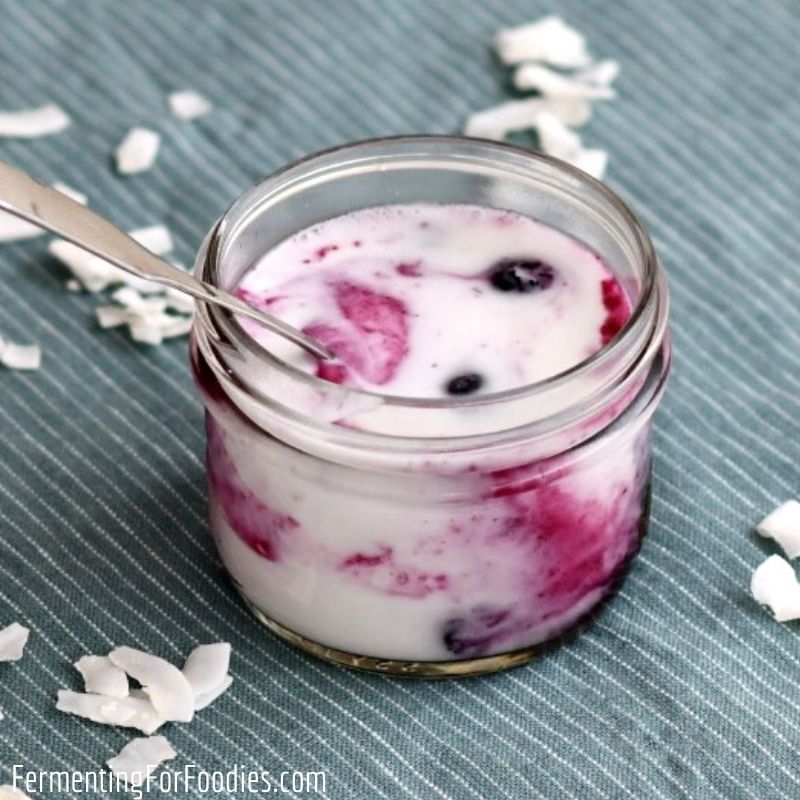
Unlike other vegan yogurts (soy milk or almond milk) coconut milk yogurt can be as thick as you want without any additives. Just use a good quality preservative-free coconut milk that contains some coconut cream.
The thickness of the coconut milk will determine how thick the yogurt is. Personally, I like to use coconut cream or a blend of coconut milk and coconut cream for thickest and creamiest vegan yogurt.
Culturing coconut milk
Choosing a culture for coconut yogurt isn’t easy. The issue is that the type of fat in coconut oil is antimicrobial. Which means that it naturally prevents bacterial growth. However, I have successfully cultured coconut cream many times. The only trick is that you should start with fresh culture each time you make yogurt. Reusing your homemade coconut milk yogurt will result in a poor culture.
What is the best culture for coconut yogurt?
Here are a few options for culturing coconut milk, including some advice for each type of culture.
- Store-bought vegan yogurt: I have tried several different vegan yogurt brands, and they all made delicious coconut yogurt. In fact, I find that vegan yogurt brands work better than dairy yogurt for culturing coconut milk. Vegan yogurts tend to contain thermophilic cultures and will need to be heated to 110 F (40 C) for culturing. If you want to use vegan yogurt, then I recommend dividing the tub of yogurt into small containers and freezing it so you can make lots of batches of yogurt from a single tub of yogurt.
- Powdered vegan yogurt culture: Buying a vegan yogurt culture is the best way to get a really active lactic bacterial culture. If probiotics are your main goal, then I recommend this option. And considering the price of vegan yogurt, it’s actually quite affordable.
- Dairy yogurt culture: I have found that it takes longer for dairy yogurt to culture coconut milk, however, it will eventually sour. Just like regular yogurt, coconut milk will need to be kept at 110F (40C) for culturing.
- Milk kefir: Coconut milk kefir is really easy to make. I don’t recommend it for your main kefir grains, but if you want to make cultured coconut milk with a kefir baby, you should be able to get a few batches. This is my main way of making homemade coconut milk yogurt because I always have extra kefir grains.
- Probiotic supplement: Unfortunately most probiotic supplements aren’t full of vigorous strains of lactic bacteria. I’ve tried to culture several expensive brands without much success. Unless you want to test the efficacy of a probiotic supplement, then I don’t recommend using it to make yogurt.
- Kombucha and other SCOBYs: I haven’t personally tried to use kombucha to make coconut milk yogurt, however, there’s no reason why it shouldn’t be able to culture coconut milk. Expect the resulting yogurt to be sparkling and acidic!
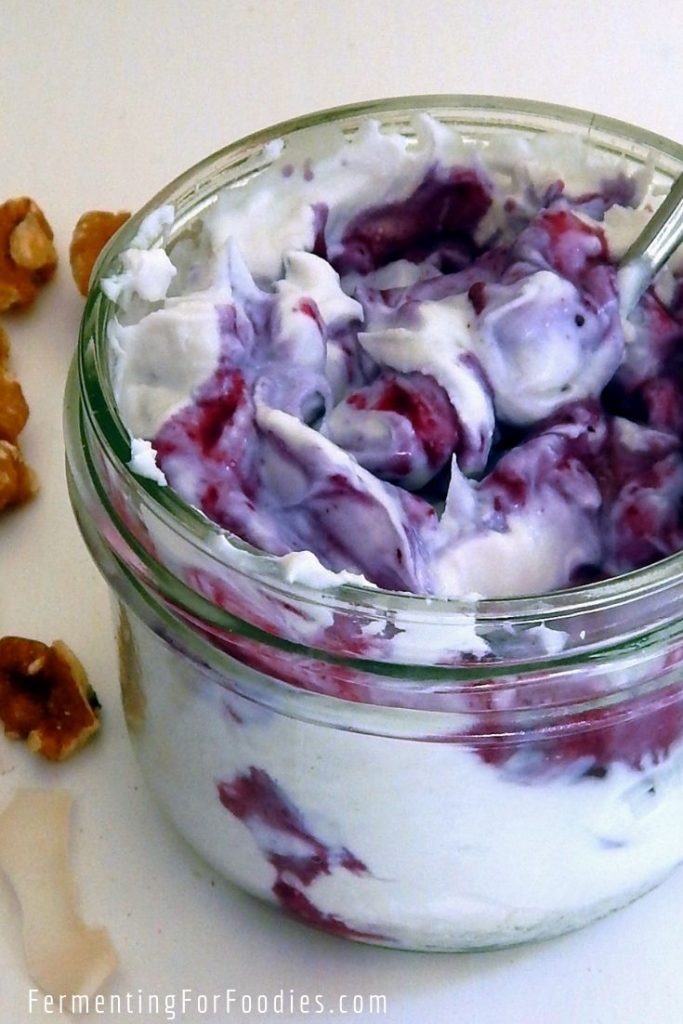
10 Ways To Serve Coconut Yogurt
If you’re interested in making coconut milk yogurt, then it’s probably because you already love it! But coconut milk yogurt is not just a delicious vegan alternative, it’s also a great way to get more probiotics into your diet.
- Stir in some fresh berries for a delicious snack.
- Mix it into smoothies or popsicles.
- Have it for breakfast with granola.
- Whip it up for serving on waffles!
- Serve it with Thai pumpkin curry soup or an Indian Mung bean curry. If you add it after serving, then you won’t accidentally kill the probiotics.
- I’ve used it in a lot of desserts including a peanut butter pudding, quinoa pudding, and ice cream.
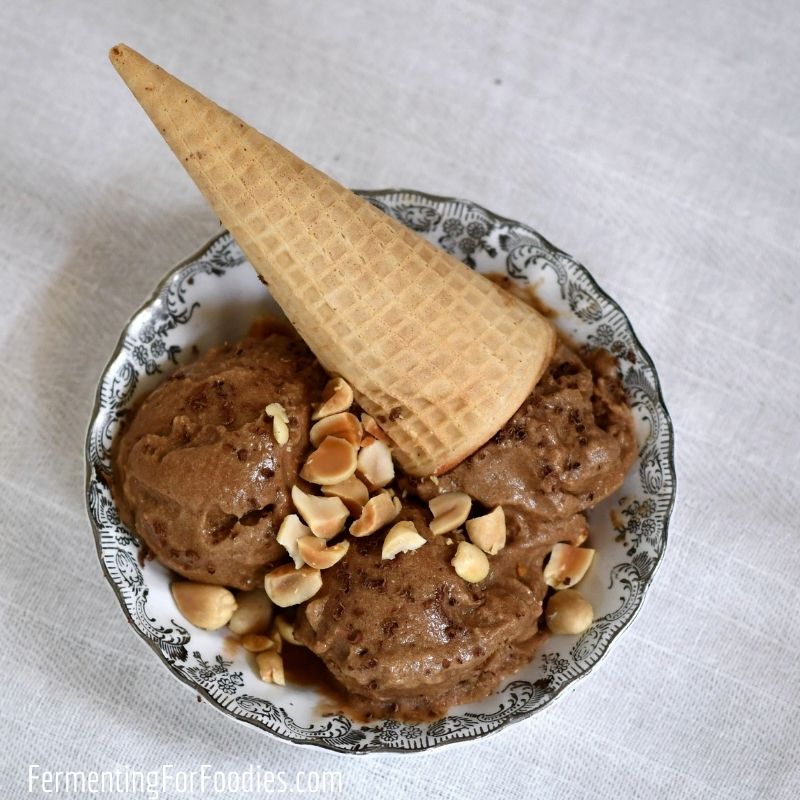
Homemade Coconut Yogurt
Coconut yogurt is the easiest dairy-free and vegan yogurt option. It can be made from several different types of culture, including grocery-store vegan yogurt. See the section above for more details.
- Prep Time: 5 minutes
- Total Time: 5 minutes
- Yield: 2 cups 1x
- Category: Snack
- Method: Fermented
- Diet: Vegan
Ingredients
- 1 can of coconut milk (preservative-free)
- 2 Tbsp of culture (see the section above for options)
Instructions
- Mix the coconut milk with the culture in a glass jar. The section above provides details on six different types of cultures that can be used for making coconut milk yogurt.
- Mesophilic cultures (milk kefir, water kefir, or kombucha) will ferment at room temperature. When using a mesophilic culture, leave the coconut milk out on the counter for 24 hours.
- Thermophilic cultures (vegan yogurt, dairy yogurt, or a probiotic supplement), need to culture at 108-110 F (40 C). When using a thermophilic culture, heat the coconut milk to 110 F (40C). Stir in the culture and maintain the temperature for 10 hours. See notes for more information.
Notes
- Canned coconut milk often contains sulfites to keep it bright white. Look for cans that are labeled preservative-free or use an organic brand. Otherwise, added sulfites will slow down or stop the fermentation.
- There are many ways to keep coconut milk warm for culturing. I have always found placing jars above my hot water tank to be quite effective. However, here’s a post on how to make yogurt without a yogurt maker.
- Nutrition information is approximate. The exact amount of sugar will depend on how long it was cultured.
Nutrition
- Serving Size: 1/4 cup
- Calories: 87
- Sugar: 2.1g
- Sodium: 24mg
- Fat: 7.5g
- Saturated Fat: 6.8g
- Carbohydrates: 2.1g
- Fiber: 0g
- Protein: 1.3g
- Cholesterol: 1mg
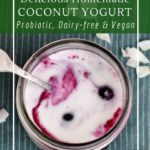
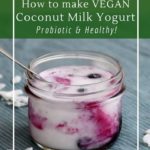
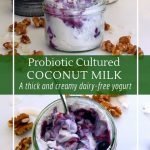
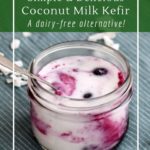
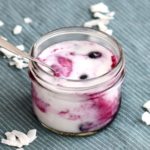
This looks good! Do you have to refrigerate it after you make it?
Yes! Ferments need to be stored in the fridge to slow the fermentation.
? I left some coconut milk in fridge and it has soured, is it ok to eat?
I’m guessing that you didn’t ferment it… so I can’t recommend eating it. Sorry!
I made coconut yogurt in my instant pot overnight. It is runny and it does not taste sour at all. Not sure if I did something wrong. I used two cans of coconut milk/cream and one packet of yogurt starter. Can I re-culture it with another packet and maybe a thickener?
Hi Kelly, Non-dairy yogurts won’t thicken. It’s the particular proteins in milk that causes it to thicken. The best way to get thick coconut yogurt is to use a thick coconut milk or coconut cream. (I usually use Thai Kitchen). If it doesn’t taste sour, then you may want to try again. There are a few things that could have gone wrong: 1. Coconut is naturally antibiotic, so you need a really good culture to get it to ferment. However, a store-bought pack of yogurt starter should be high-quality and able to ferment coconut milk. 2. Is there any chance your instant pot was on high? It needs to be on medium otherwise it can kill the yogurt culture. There’s no need to boil coconut milk. 3. Coconut milk often contains sulfites, which will prevent fermentation. Look for brands that are labelled Preservative Free. Depending on where you live, sulfites aren’t required to be labelled in the ingredient list.
Hopefully, this helps!
I am preparing to make my first batch of coconut milk yogurt. I am using Thai kitchen organic coconut milk that has guar gum and a vegan yogurt starter I purchased at the health food store.
I do not own a yogurt maker. A couple of questions to clarify and confirm my understanding on the process.
Sterilize the glass jars that I am going to use, allow them to cool to room temp.
Bring the coconut milk up to a temperature of 110 degrees. Pour the coconut milk into the jar(s) Add 2 TBSP of culture per can of coconut milk. Stir with a whisk or wooden spoon. No metal.
Do I cover the jars with plastic lids or with cheese cloths?
I plan to put them in my slow cooker with 2 inches of water in the bottom of the slow cooker and keep them on the KEEP WARM setting for 10 hours.
Does this all sound right?
Thanks
Hi Lita, I’m guessing you’re working off of a few recipes? I am much more relaxed in my approach to fermenting. I have been making coconut yogurt for at least 6+ years without an issue, so my advice is based on a lot of experience. 🙂 Hopefully, I’ve addressed all your questions/comments below.
Thai Kitchen coconut milk is sulfite-free! So it should work well for you.
I usually don’t sanitize my jars for yogurt. That’s because they only ferment for a day before popping them in the fridge. (I only sanitize jars for ferments that are going to be out for more than a week). However, if you have mold issues in your home, or don’t have good refrigeration, then sanitizing the jars is a good idea.
It is better to use a metal spoon than a wooden one. The idea that metal is harmful to cultures comes from a pre-stainless steal era and is mostly a folk myth at this point. As long as you don’t have copper or brass spoons, you should be fine. 😉 On the other hand, a wooden spoon could contain bacteria and yeast, so I don’t recommend it.
Yogurt is not a yeast-based culture, so it won’t bubble. I recommend capping your jars with their lids (metal is fine) to keep out unwanted wild cultures.
Because you are using a yogurt culture, the coconut milk does need to be kept at 110F to culture properly. The slow cooker heating option sound perfect. Since it’s your first time, I recommend checking the temperature after 2 hours just to see where it’s at. It doesn’t have to be precisely 110F, but you don’t want it to be hotter than that or it could kill the yogurt culture.
Hope this helps! Best of luck with your ferment! Emillie
Thank you for your reply Emillie.
My slow cooker on warm go to hot 120-130, so I quickly wrapped them in a towel and put the jars in my oven with the light on. I also add 2 jars with just really hot water into the oven. ( I had to leave for work quickly so this was my quickest option. For the future do you leave the slow cooker lid open during the fermentation process? How long do I leave it in the oven with light on. Some things I have read say 24-48 hours. I haven’t found where you give an about amount of time.
My thermometer is also a metal one. Hope that doesn’t matter. I am looking for ward to achieving my goal of making my own coconut milk yogurt.
The metal thermometer is perfectly fine to use. 🙂
My slow cooker has a precise temperature gauge, which makes it super easy to use. I think switching to the stove was a good idea since your slow cooker is too hot. It’s fine to leave your yogurt to ferment for longer than 10 hours. It will just get more sour. So perhaps taste a little when you get home from work and see what you think? It’s entirely up to you how long you want to culture it. Flavor is the best guide for how long it needs to ferment. Just be sure to test using a clean spoon each time.
Enjoy!
Thank very much for taking the time to answer my newbie questions. I tasted the “yogurt” at the 10 hour ish mark and there was not tartness at all. The temp of the yogurt is only around 70 degrees in my oven with the light on. I did wrap back up in the towel and heated up the 2 water jars and put back in the oven.
Ah, I’m guessing you have an LED light in your oven. Hopefully, the jars of hot water worked to keep everything warm? I have had a lot of success with wrapping jars in sweaters and then placing them on my hot water tank.
Alternatively, the yogurt culture might not be that vigorous. It’s always disappointing to discover your store-bought yogurt really isn’t that probiotic. I’ve tried many yogurt cultures and only about 50% of them are alive enough to make more yogurt. (My success with using a probiotic supplement to make yogurt is even lower than that!) I’ve had good luck with Nancy’s brand of vegan yogurt, but I’m not sure it’s widely available.
Good luck! Emillie
My first attempt did not work out. I am borrowing a friends pampered chef slow cooker. Hoping it works this time around.
Hopefully! It won’t thicken like trad yogurt, but it should taste sour. Good luck!
Started again. Brought the coconut milk up to 110 degrees. Added one packet of NW Ferments vegan yogurt starter. For use with alternate milks. Put it a Pampered Chef cooker with a yogurt setting on high (105degrees) 22 hours in. Just starting to get a bit of sour/tang to it. Has some light tan colored specs in it.
Has it gone bad?
After 32 hours in the Pampered Chef slow cooker on Yogurt setting. The coconut milk doesn’t taste tart. It taste more like sour cream. Had some chunky floating stuff so I strained it and put it into glass jars in the fridge. Will see what it looks, smells and taste like tomorrow. Keeping my fingers crossed for a positive outcome.
Ok, feeling frustrated with trying to make the coconut milk yogurt. It came out no tart and thin like no fat milk.
Wondering if the NW fermentation yogurt starter was bad.
Back to the drawing board.
Sorry for not getting back to you sooner. My husband’s away, so I’m solo parenting this weekend, which leaves very little free time. Soy milk is the only non-dairy yogurt that thickens as it ferments. I suspect it’s why tofu exists! Not tart is suspicious. I don’t know that particular brand of starter, so I can’t comment on it. However, if you want thicker coconut milk yogurt, you could use coconut cream or add a thickener. My personal favorite is chia seeds because they double as a good source of fiber. Cheers!
Hi Emillie, I gave up on the coconut yogurt as none of the preservative-free coconut milks and creams I could find in my area in New Zealand produced a reasonably thick yogurt. I returned to the one and only recipe I made successfully before I found your website, which uses cashew nuts and a probiotic. Today I finally received your book (yay!) and saw that you recommend tapioca flour in the recipe in the book. I hope that this will work next time once I ate my big cashew batch that’s sitting on my bench right now. I should have waited another day…
I was hoping to find a recipe for kombucha SCOBY jerky in the book. But no, sadly. Did you get my message I sent you earlier about the online version?
Your book will keep me busy for a while. I also bought it to say thank you for all the free content you provide here on the internet.
Cheers
Hi Sigi,
I’m pretty good about replying to all comments within 1 to 2 days, but I don’t remember seeing one about SCOBY jerky. Did you leave it on the blog or on social media? Glad you are enjoying my book! Feel free to reach out if you have any other questions or comments. Cheers, Emillie
Hi Emillie, I sent you a message through “contact” on this website. I guess it was in the first week of January. Please let me know if you want me to write again. It’s something I didn’t want to write here on the comments as it has nothing to do with fermenting. Cheers Sigi
Sorry, I checked my email and didn’t get it. I do automatically mark posts that are about guest posts, advertising, etc. as spam. Cheers!
Hi Emillie,
I am brand new to this! I ordered a yogurt maker and the began yogurt starter culture. I am confused though…the recipe says 2 Tbsp of starter yield 2 cups of yogurt but each packet is only 1.6g. Can you clarify how many packets of the vegan yogurt starter to use?
Thanks!
Hi Karen, The 2 Tbsp of starter in this recipe is already cultured yogurt. (So if you bought yogurt in the store or saved yogurt from a previous batch). When using powdered yogurt starter, follow the proportions on the package. They are all a bit different based on how they were made. Use enough to set 2 cups of coconut milk. If the packaging doesn’t tell you how much to use, try 1/4 tsp. (I’m not sure that will be enough, but it’s what I have used in the past). Cheers, Emillie